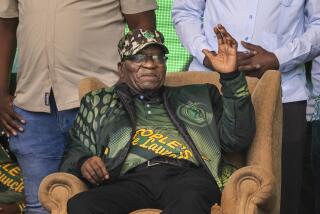Serbs Veto Panic’s Presidential Candidacy : Politics: Orange County businessman is ruled ineligible on basis of residency requirement.
- Share via
BELGRADE, Yugoslavia — As Serb-instigated violence erupted in volatile Kosovo province and elsewhere Thursday, authorities rejected moderate Yugoslav Prime Minister Milan Panic as a candidate for the Serbian presidency.
The Serbian electoral commission deemed the Orange County businessman ineligible to participate in the Dec. 20 election on the grounds that he fails to meet a one-year residency requirement enacted by his political opponents only a month ago.
Panic, a naturalized U.S. citizen who returned to his internationally scorned homeland in July, was considered by Western diplomats to have had the best chance of a dozen contenders trying to unseat Serbian strongman Slobodan Milosevic.
Western leaders have accused Milosevic of provoking and bankrolling Serbian insurrections in Croatia and Bosnia-Herzegovina that have left tens of thousands dead and imposed rebel Serbian rule over huge areas.
Panic claimed to have resided in Belgrade for business purposes since 1991, but that position failed to win over election organizers, many of whom owe their jobs to Milosevic.
“He was a foreign citizen at the time,” commission spokesman Zoran Djumic said of Panic. “He asked for Yugoslav citizenship just before he was to be selected for federal premier.”
Panic announced Tuesday that he would challenge Milosevic and brashly dismissed suggestions that he would be disqualified by the residency rule. Without the strong competition Panic would have presented, Milosevic could win reelection and the appearance of a popular mandate for the aggressive policies that now threaten to engulf other areas of the Balkan peninsula.
A shooting in the Kosovo capital of Pristina earlier in the day provided a reminder of simmering conflicts waiting to erupt in the region. Serbian police loyal to Milosevic opened fire on ethnic Albanians at an outdoor market, killing at least one shopper and wounding others.
Belgrade’s staunchly nationalist media claimed that a police patrol had been attacked by the crowd. But a dispatch from the opposition Albanian Democratic League of Kosovo to news agencies here said police “opened fire on an unarmed crowd with no reason whatsoever, causing heavy casualties.”
The market attack brings to more than 100 the number of ethnic Albanians killed in Kosovo since heavily armed Serbian police stepped up security in the province four years ago, ostensibly to prevent secession by the Albanians who make up 90% of Kosovo’s 2 million people. No Serbs are known to have been killed in the crackdown, although most of the fatal shootings are said by the state-run media to have stemmed from Albanian attacks.
Panic has paid several recent visits to Kosovo in an attempt to ease tensions. Those conciliatory moves and his calls for an end to the bloodshed in Bosnia have mostly fallen on deaf ears and exposed him to nationalist accusations that he is selling out Serbia to ethnic enemies.
In other developments:
* Fierce attacks from Serbian positions on suburbs around Sarajevo’s airport forced the United Nations to suspend aid deliveries to the Bosnian capital for the third straight day.
* A Danish peacekeeper abducted while jogging near his base in central Bosnia was released overnight after being held at gunpoint for eight hours. Lance Cpl. Brian Neilsen, 22, said after his release in the city of Kiseljak that his captors appeared calm and organized but that he was unable to discern their motive for seizing him, a U.N. statement said.
* At least two people were killed by Serbian shelling of the northwest Bosnian city of Bihac, one of only a handful of refuges for displaced Muslims, Croatian Radio reported.
More to Read
Get the L.A. Times Politics newsletter
Deeply reported insights into legislation, politics and policy from Sacramento, Washington and beyond. In your inbox three times per week.
You may occasionally receive promotional content from the Los Angeles Times.











